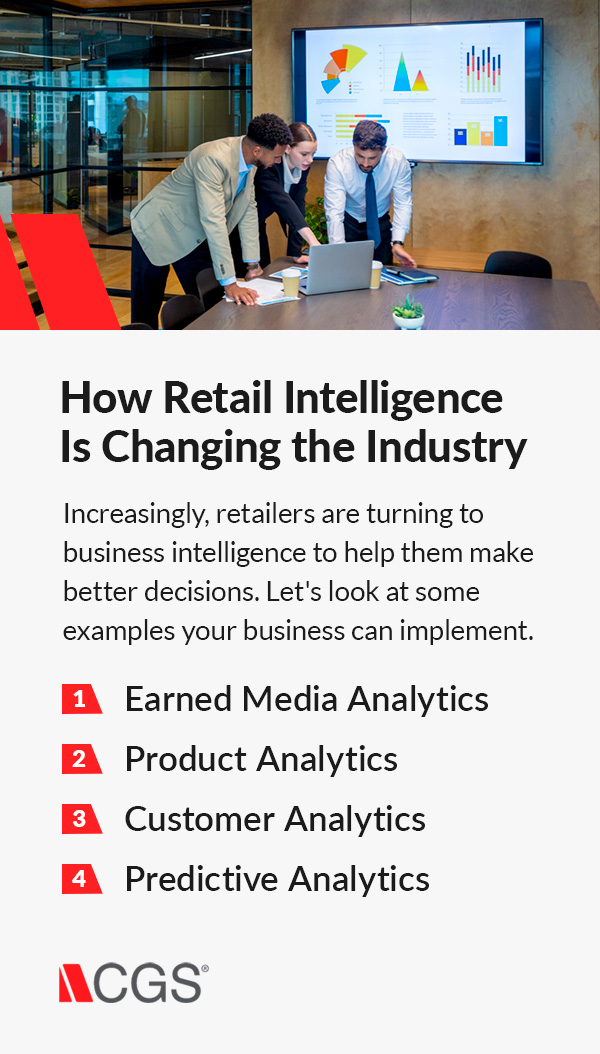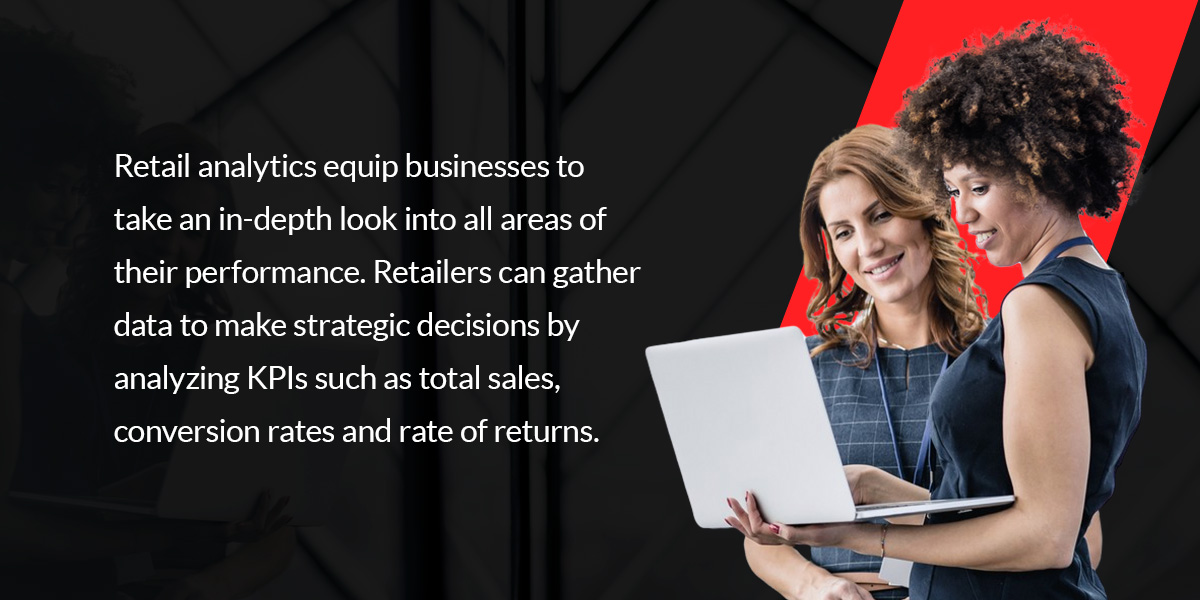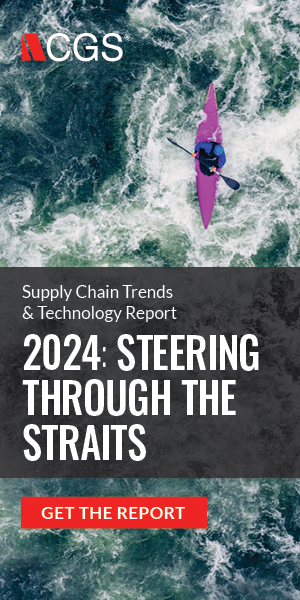Daniella Ambrogi is Senior Global Marketing Director for CGS's Application Services division, which offers BlueCherry® software and services to 500+ fashion, footwear, consumer goods and retail companies worldwide. Ambrogi offers 20+ years of experience in the fashion and retail business; she understands a brand's complex needs in an ever-changing marketplace.
Topics
How Retail Analytics Is Changing the Industry

Data analytics in the retail industry is changing how businesses operate. Increasingly, retailers see value in gathering information about customer experiences, inventory, supply chain and other business functions to make better decisions.
In such a highly competitive industry, retailers must think ahead to meet consumer demand, creating experiences that foster loyalty. One thing is sure — business intelligence is changing the retail industry landscape, and retailers must embrace these changes to succeed.
What Is Retail Analytics?
Data analytics in retail requires collecting information to gain valuable insights that inform decision-making. Retailers can analyze critical metrics such as customer behavior, while tracking inventory levels and measuring marketing campaign effectiveness.
Using these insights, retailers can make wise choices to improve operational efficiency, inventory management, customer experience and sales. For example, retailers can track and analyze customers' purchase history to understand their behavior. Armed with this information, they can decide which products to stock and even change their stores' layout. It allows retailers to revolutionize the front and back ends of their business.
Retail analytics is more than surface-level data. It's about deep data mining and using insights gathered from multiple sources to improve accuracy. Retail is highly competitive, leaving little room for error. Retail companies must make wise choices, and data analytics in the retail industry takes the guesswork out of supply and demand.

Benefits of Retail Business Intelligence
The primary advantage of retail business intelligence is to help you make informed decisions and improve your business operations. Here are five additional benefits retailers can reap.
1. Improved Merchandising
When you know your customers' favorite products, you can use this information to make better decisions about what you stock, merchandising your physical and online stores accordingly.
2. Understand the Customer Journey
Retail business intelligence enables businesses to understand customers' behavior at every step along their journey. You can see where shoppers come from — including their physical locations and what channels they use to arrive at your store. You can then form stronger relationships by offering them a customer-centric experience.
3. Effective Marketing
BI in the retail industry can help you understand which of your marketing campaigns and messages are the most successful. You can see what people click on, open, and interact with. Then, you can use this information to refine your campaigns and invest in new marketing efforts to drive sales and increase revenue.
4. Better Inventory Management
Using the data from business intelligence, you can better predict the demand and plan accordingly. You can restock your inventory before it runs out to ensure shoppers never encounter disappointing shortages. It can also help you identify when stock is about to expire and sell it at a discount, so you don't have to waste money by discarding it.
5. A Personalized Customer Experience
Tailoring the customer experience drives engagement, satisfaction, and retention. Happy shoppers are more likely to recommend your business to others, thus driving sales and profitability.
Data Analytics Challenges in Retail
While analytics in retail brings several benefits, the following are five hurdles of harnessing this tool.
1. Accuracy
Retailers can gather information from various sources, including sales volumes, profit margins, inventory levels and marketing campaign effectiveness. To ensure accuracy and maintain data integrity, retailers should use specialized data retrieval software. You must also train your staff to use this software.
2. Data Protection Law and Standards
Retailers must stay abreast of changing data protection laws. When gathering data, ensure your processes adhere to all standards to prevent customers' private information from landing in the wrong hands. Safe data handling can include enacting strict storage policies and educating your team on why it is crucial to follow them.
3. Building Customer Trust
Customers who trust your business are more likely to give you their data. If you offer loyal shoppers exclusive benefits, such as discounts, they may be more willing to supply their information. Building customers' trust requires you to provide stellar service and maintain an excellent reputation.
It signifies trustworthiness when your marketing and branding align with how you do business and interact with your customers. Be transparent with people about how you will store and use the information they provide, then follow through with your promises.
4. Sophisticated Technology
Mismatches between the sophistication and capabilities of retailers' tools are widespread. Retailers with outdated software and systems might struggle to retrieve and analyze data. Technology and business intelligence go hand in hand, and retailers should upgrade their software to leverage and handle massive databases. Being well-versed in technological advances such as machine learning and artificial intelligence can be challenging if your company lacks the knowledge or resources to invest in them.
5. Rising Competition
Overcoming these data analytics challenges is essential for companies to keep up with the competition. As competition grows in the retail industry, retailers must find ways to differentiate themselves. Upgrading technology and broadening your use of business intelligence tools will help you stay ahead of the competition.
How Retail Intelligence Is Changing the Industry
Increasingly, retailers are turning to business intelligence to help them make better decisions. The data-driven insights on customer engagement, store performance, merchandising and inventory management are revolutionizing the retail industry — let's look at some examples your business can implement.
1. Earned Media Analytics
E-commerce brands always search for ways to drive more traffic to their stores and boost sales. Earned media analysis gives business owners insight into whether their marketing strategies are working. With this analysis, you can examine the channels visitors use to arrive at your site, such as social media, organic search and email marketing. Then, you can use the data you gather to develop marketing campaigns that appeal to potential customers.
2. Product Analytics
Business analytics can help you identify which items are selling well, which products are not moving and when it's time to restock. Then, you can decide what products to stock more of and what they can discount to help move inventory. This data is vital for retailers because it helps them determine where they are most profitable.
With so many competitors on the market, you must know what products your customers want and ensure you have these options available. If people don't find what want from you, they will look elsewhere.
Retailers can also use product analytics to forecast future demand and ensure they have enough stock, especially during peak seasons.
3. Customer Analytics
Customer analytics in the retail industry gives you an in-depth look at how shoppers engage with your business. It enables companies to track consumer interactions across various platforms, including social media, website, email and phone calls. Retailers collect this information to understand how to improve the customer experience and enhance their reputation in the industry.
4. Predictive Analytics
Predictive analytics uses machine learning to anticipate what may happen in the future. Retailers use this forecast to plan for sales and stock up on the products that will soon prove profitable.
Retail Analytics Trends
As business intelligence becomes a must-have in the retail industry, merchants can get on board with a few trends to gain a competitive advantage.
1. Personalize Experiences
The ability to track customer interactions and spending habits gives retailers insight into consumer wants and expectations. With this understanding, businesses can refine their communication, marketing and product offerings to appeal to different segments of shoppers. Personalizing consumer retail experiences drives sales and increases customer loyalty. To leverage this trend, retailers need a single data analytics platform that enables them to develop and expand on this level of personalization.
2. Predict Spending and Demand
Business intelligence uses machine learning to anticipate future trends in customer data. The analytics give merchants information about how much of a product or service customers want during a specific period.
When forecasting demand, retailers can plan for busy periods by using targeted marketing to encourage customers to spend. They can optimize their supply chain and ensure they have the right products in stock when shoppers want them. Retailers can also use this data to plan for slow periods by offering discounts that move inventory.
3. Develop Pricing Models
Savvy retailers use dynamic pricing algorithms to optimize their pricing and increase their profit margins. Business intelligence in retail automatically offers retailer pricing suggestions, equipping businesses to make choices that improve their bottom line. To remain competitive, retailers need to keep a percentage of their prices low.
Key value items are often the top sellers and can make up a significant portion of revenue. Since most buyers want to feel like they're getting a good deal, key value items play a vital role in how customers perceive your brand. You can strategically place them alongside higher-priced items, subtly encouraging customers to spend more. Retail analytics software can help retailers optimize pricing to increase profit margins.
4. New In-Store Experiences
Retailers can also leverage business intelligence in their physical and online stores to create ideal customer experiences. For example, some businesses offer the option to purchase items online and pick them up from a physical store without paying for shipping. You should analyze the data you collect and reconsider opportunities to exceed consumer expectations.
Business intelligence tools can also improve employee productivity and performance. When in-store employees anticipate customers' needs and wants, it can go a long way toward building brand loyalty.
5. Omnichannel Integration
Consumers' shopping habits have changed, and retailers should provide a tech-savvy solution that integrates various channels. Because few retailers have mastered the balance required to provide a consistent shopping experience across online and offline channels, embracing omnichannel integration will give you a competitive edge.
6. Revolutionizing Labor
A nationwide labor shortage has significantly impacted the retail industry, and about 74% of retailers say they feel the effect. They are turning to automation to fulfill tedious tasks and tackle the need for more human resources. To tackle inefficiencies and streamline operations, retailers must leverage current automation tools and identify areas to shore up. For instance, consider automating order confirmation messages and customer loyalty programs.
7. Voice Search
People increasingly use voice search technologies to carry out everyday activities, including shopping. Whether it's asking for directions to a physical store or browsing for products, many consumers automatically turn to voice search. You can use this technology the same way you rely on search engine optimization for your website — by using natural speech patterns and user intent in their keywords.
8. Machine Learning
Tech-savvy retailers have adopted machine learning, a subset of AI. A standout feature of machine learning is conversation bots, which learn from a business' operations and improve over time. Another characteristic is a visual search, which allows customers to search a product's image for the brand and pricing. This technology is one of the most advanced approaches that will revolutionize the future of retail.
Leveraging Retail Analytics Software
Retail analytics equip businesses to take an in-depth look into all areas of their performance. Retailers can gather data to make strategic decisions by analyzing KPIs such as total sales, conversion rates and rate of returns.
Specialized software enables data analytics for retail, allowing businesses to analyze all their functions and store locations in real time. Retailers can analyze customer data to understand spending habits and which items they purchase. They can also further segment their customers by preference. The software allows sales and marketing teams to uncover crucial consumer trends they can use to create better strategies.
Besides giving you unparalleled insights into your customer behaviors, retail analytics provides you with a complete view of your operations. It equips you with the data you need to streamline business operations. You'll have firmer control over the product life cycle and pinpoint areas to improve to meet consumer demand.
Request a Demo of BlueCherry® Suite
Retail analytics play an essential role in the decision-making process. Retail businesses can improve their overall operations by analyzing customer data and the product life cycle. In a fiercely competitive industry, company leaders must leverage new technologies that help them predict future trends and stay ahead of the game. While there are some challenges to adopting these new technologies, the right retail analytics software can help you conquer them.
BlueCherry® is an award-winning, end to end solution with comprehensive tools that give retail companies essential insights. It integrates seamlessly into your current system, so you can meet the demands of your fast-paced industry. Learn more about how BlueCherry® can help your business — request a demo today!
Daniella Ambrogi is Senior Global Marketing Director for CGS's Application Services division, which offers BlueCherry® software and services to 500+ fashion, footwear, consumer goods and retail companies worldwide. Ambrogi offers 20+ years of experience in the fashion and retail business; she understands a brand's complex needs in an ever-changing marketplace.




